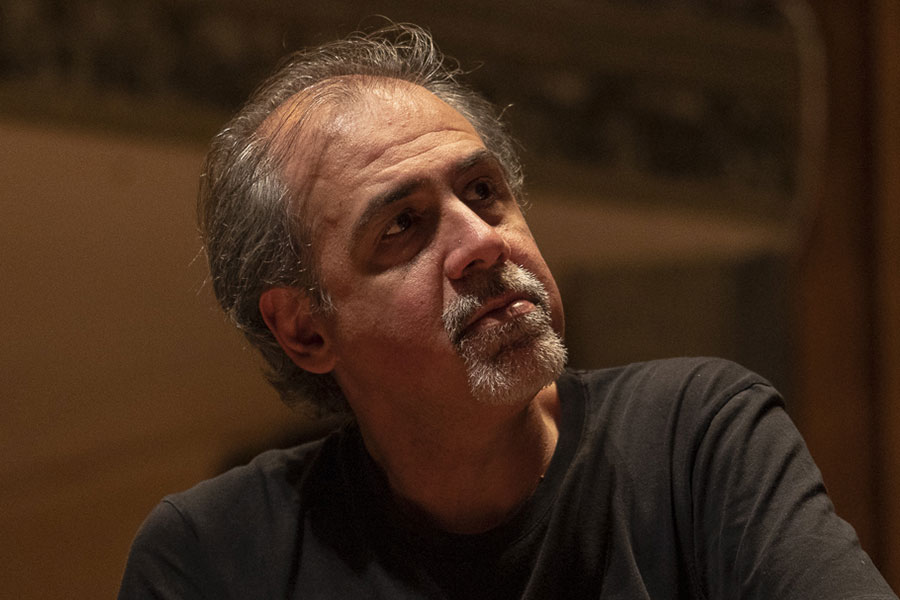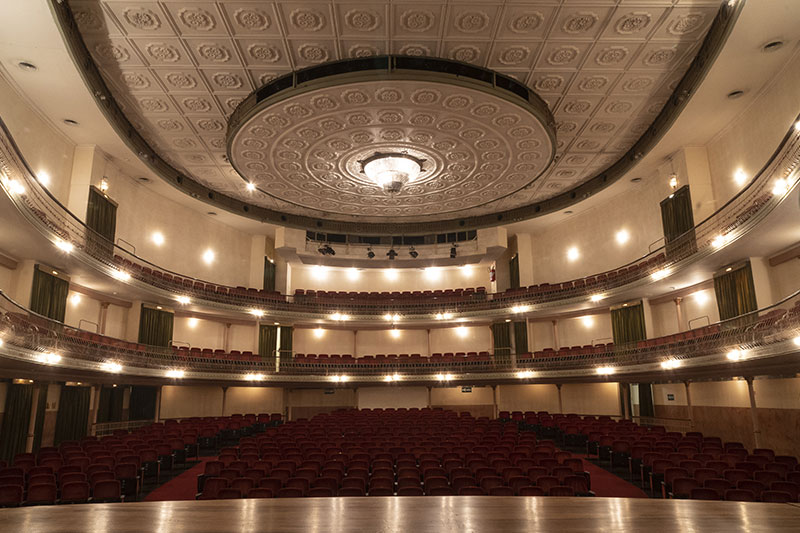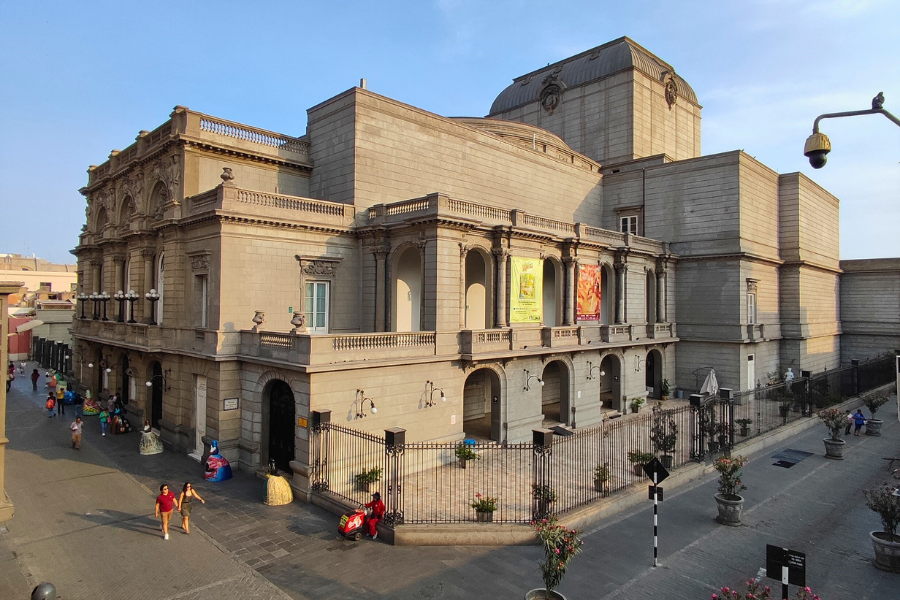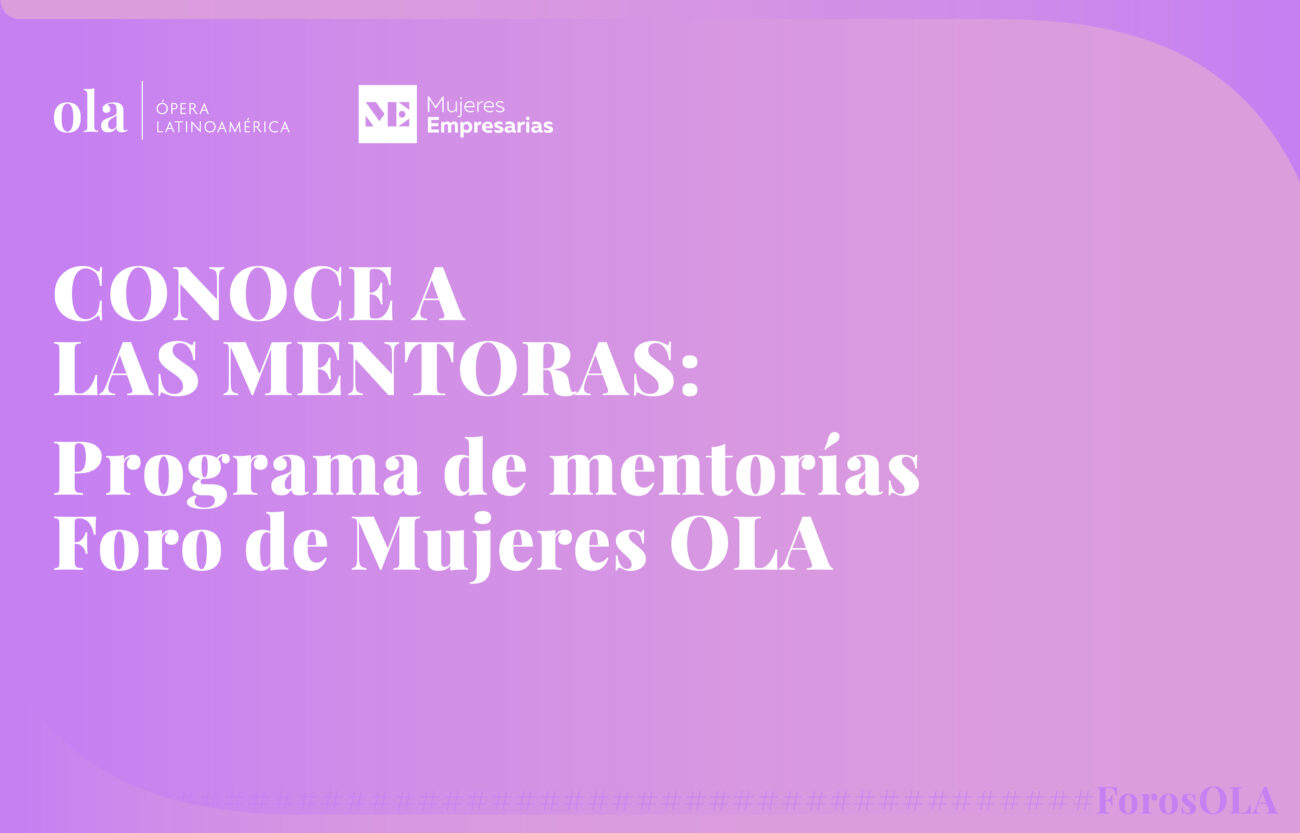Paulo Zuben: “Promovemos la reflexión sobre el lenguaje musical y su papel dentro de la sociedad”

Entrevista de bienvenida a Paulo Zuben, Director Artístico Pedagógico del Theatro São Pedro – Santa Marcelina Cultura de São Paulo, Brasil.
El Theatro São Pedro se inserta tanto en la tradición de los teatros de ópera creados a principios del siglo XIX y XX como en la proliferación de salas de conciertos en los barrios de São Paulo. Después de someterse a una restauración, se volvió a abrir en 1998 con el estreno de La Cenerentola de Gioachino Rossini.
Poco a poco, la ópera llegó a ocupar un lugar destacado en la programación de São Pedro, y en 2010, con la creación de la Orquesta de Teatro São Pedro, se reafirmó esta vocación. A lo largo de los años, sus temporadas líricas apostaron por la diversidad, con títulos conocidos del repertorio tradicional, obras poco representadas, además de óperas de compositores brasileños.
Ahora, el Teatro comienza una nueva fase, respetando su propia historia y atento a los nuevos desafíos del arte, la cultura y la sociedad.
¿Cómo se está organizando para la reapertura del teatro post Covid-19?
El gobierno local y el Ministerio de Salud están definiendo las pautas para la reapertura de las instalaciones culturales en el estado de São Paulo. Nuestras actividades se han suspendido desde el 16 de marzo y se suspende toda la temporada programada para 2020. Nuestra propuesta es que los títulos planeados se produzcan sólo a partir de 2021. En este año de 2020, volveremos a abrir el teatro en el segundo semestre solo para grabaciones de conciertos sin público. Si el programa de reapertura del Gobierno del Estado de São Paulo permite la entrada del público antes de fin de año, gradualmente reanudaremos los shows observando todos los protocolos de seguridad para nuestros profesionales y público.
Desde su inauguración en el siglo XIX el teatro se ha destacado por su calidad musical entre conciertos, galas, óperas y zarzuelas. ¿Cómo este tradicional teatro paulista ha logrado mantenerse en el tiempo y cómo ha mantenido la atención del público?
Inaugurado en 1917, el Teatro São Pedro fue construido en un estilo ecléctico, predominantemente neoclásico con detalles art nouveau. El proyecto preparado por el arquitecto italiano Augusto Bernadelli Marchesini contempló un escenario italiano con forma de herradura, así como una audiencia, frisos, mostradores y cabañas, diseñados para trabajar con programación mixta, dado que su diseño permitió la instalación de pantallas de proyección. Concebido para ser un espacio dedicado a operetas, teatro y espectáculos de variedades, además de proyecciones de cine, São Pedro alternó, en sus primeras décadas de actividad, la presentación de compañías nacionales y extranjeras, con conciertos de música clásica. Fue una época de florecimiento cultural y Theatro São Pedro se inserta tanto en la tradición de los teatros de ópera creados a principios del siglo XIX y XX como en la proliferación de salas de conciertos en los barrios de São Paulo. Es uno de los pocos restos de ese tiempo.
En estos más de 100 años, Theatro São Pedro ha pasado por varias fases y reinvenciones. Entre idas y venidas, fue escenario de resistencia política y cultural, y recibió grandes nombres de figuras de nuestra música, como Eleazar de Carvalho, Isaac Karabtchevsky, Caio Pagano y Gilberto Tinetti, además de haber sido sede y anfitrión de conciertos de la Orquesta Sinfónica del Estado de São Paulo (Osesp).
Después de una restauración, fue reabierto en 1998 con la producción de La Cenerentola, de Gioachino Rossini. Poco a poco, la ópera llegó a ocupar un lugar destacado en la programación de São Pedro, y en 2010, con la creación de la Orquesta de Teatro São Pedro, se reafirmó esta vocación. A lo largo de los años, sus temporadas líricas apostaron por la diversidad, con títulos conocidos del repertorio tradicional, obras poco representadas, así como óperas de compositores brasileños, haciendo de Theatro São Pedro una referencia en la escena lírica del país.
El desafío de São Pedro es respetar su propia historia y estar atento a los nuevos desafíos del arte, la cultura y la sociedad. En este sentido, la planificación artística de la casa busca expandir el horizonte de su programación, en busca de una relación cada vez más estrecha entre el teatro y su audiencia diversa.
Con el devenir de nuevas generaciones, ¿Qué acciones han tomado desde la programación y audiencias para el desarrollo y creación de nuevos públicos?
Para cautivar a nuevas audiencias, instigar y promover la reflexión de la audiencia, buscamos contemplar ideas más contemporáneas en la curatoría artística, no solo con respecto a la elección del repertorio, sino también en la forma de interpretarlo.
Comenzamos con una amplia reflexión sobre lo que las obras pueden sugerir para nuestra sensible experiencia actual, tanto en términos de invención musical como de posibilidades interpretativas. En este sentido, buscamos, por ejemplo, encargamos la creación de nuevas obras. También contemplamos acciones para democratizar el acceso y llegar a nuevas audiencias, como realizar ensayos abiertos gratuitos de todas las producciones de ópera y conciertos. Como una forma de proporcionar más actividades, y también realizamos presentaciones gratuitas en otros espacios de teatro, como el vestíbulo y la cafetería. Entre otras acciones para la formación del público, también promovemos conciertos y conferencias didácticas.

¿Cómo es la línea programática del Teatro? ¿Buscarán la innovación a través de nuevos formatos de ópera o nuevos títulos?
La programación de Theatro São Pedro está prevista para incluir los siguientes ejes: realización de producciones de ópera y conciertos sinfónicos con la Orquesta de Teatro de São Pedro, ensayos abiertos al público, conciertos didácticos y de música de cámara, además de mantener un programa formación para jóvenes cantantes e instrumentistas con la Academia de la Ópera y la Orquesta Juvenil de Theatro São Pedro.
El teatro también alberga otras actividades durante todo el año con el objetivo de expandir el público que frecuenta el lugar. La elección de títulos para producciones de ópera busca abarcar un repertorio que va más allá del siglo XIX. Sin excluir los títulos y compositores más escenificados, buscamos equilibrar la programación eligiendo títulos que sean más raros para ser representados en Brasil y que sean apropiados para el perfil de Theatro São Pedro, con el fin de ofrecer al público una diversidad del espectro operístico, como por ejemplo , fue el caso de la ópera barroca Alcina, de Georg Friedrich Händel, interpretada en 2018. Entendemos que también se necesitan óperas contemporáneas, así como títulos más tradicionales del repertorio de compositores como Bellini, Donizetti, Mozart, Rossini, porque son fundamentales para el desarrollo. de la propuesta artística del teatro.
En nuestra curaduría artística, buscamos el equilibrio de hacer títulos que sean alternativos a los presentados regularmente, pero fundamentales para comprender la importancia de la ópera como un lenguaje aún moderno. En 2019, por ejemplo, produjimos dos estrenos mundiales de dos compositores brasileños: Ritos de Perpassagem, de Flo Menezes, y O Peru de Natal (El pavo de navidad), de Leonardo Martinelli.
Desarrollamos en Theatro São Pedro una estrategia para ocupar su espacio a fin de permitir el diálogo y una relación cada vez más estrecha entre la casa y su audiencia. Por lo tanto, el Teatro también alberga un programa que también cubre la música popular brasileña.
El teatro cuenta con una academia de ópera y de orquesta de jóvenes. ¿Cuánto tiempo llevan, cuáles son sus objetivos, desafíos para el futuro y a cuántos jóvenes han beneficiado?
La Academia de la Ópera y la Orquesta Juvenil del Teatro São Pedro constituyen el eje de formación del Teatro São Pedro. La Academia se compromete a contribuir a la formación de nuevos cantantes líricos brasileños. A través del contenido programático vinculado al género de la ópera, en la Academia promovemos oportunidades prácticas para el desarrollo artístico de los jóvenes cantantes a través de actuaciones organizadas con orquesta y formaciones de cámara. La propuesta pedagógica incluye una malla curricular de actividades, como clases, talleres y asambleas de ópera, para preparar a los estudiantes para el mundo profesional.
La Orquesta Juvenil Theatro São Pedro realiza actividades artísticas y pedagógicas vinculadas al género operístico con el objetivo de desarrollar el nivel técnico y artístico de los jóvenes instrumentistas. El grupo participa junto con la Academia de Montajes de Ópera en el Teatro São Pedro, que permite a los jóvenes experimentar una producción equivalente a montajes profesionales.
Tenemos el desafío de preparar a los jóvenes, cantantes e instrumentistas para el mundo contemporáneo y no para el pasado. Entendemos que la capacitación debe acompañar el desarrollo de la profesión y los desafíos impuestos por el presente. Obviamente, los estudiantes necesitan, además del desarrollo técnico-musical, experiencias artísticas que les ofrezcan la oportunidad, por ejemplo, de vivir con profesionales nacionales e internacionales de primera clase, experimentar montajes con repertorios desafiantes de varios estilos y períodos musicales y, sobre todo, participar en un entorno musical en el que su formación es el objetivo principal de las acciones realizadas. Además, no podemos dejar de creer que la capacitación es esencial para que los estudiantes se sumerjan cada vez más en el universo musical en toda su complejidad, y se les anime a reflexionar sobre el lenguaje musical y su papel dentro de la sociedad. Solo con esta reflexión podrán contribuir a resaltar a la sociedad la relevancia de hacer arte y por qué la cultura es tan importante en nuestras vidas.
SOBRE PAULO ZUBEN
Paulo Zuben es compositor y gestor cultural. Tiene un doctorado en Musicología (2009) de ECA-USP y una maestría en Comunicación y Semiótica (2003) de PUC-SP. Graduado en Música (2000), Licenciado en Composición de la Faculdade Santa Marcelina, y Graduado en Administración de Empresas (1991) de FGV-SP. Fue académico de la FAPESP entre 1997 y 2002. Fue académico del Programa del Director Ejecutivo durante los años 2011 a 2013, cuando tuvo la oportunidad de estudiar en Harvard Business School, Ross School of Business en la Universidad de Michigan y la Universidad de Texas, en un programa de capacitación organizada por la institución estadounidense National Arts Strategies (NAS).
Desde 2008, es director artístico y pedagógico de Santa Marcelina Cultura, la organización social responsable de la gestión de la Escuela de Música del Estado de São Paulo – EMESP Tom Jobim, de Theatro São Pedro, Guri Capital y Gran São Paulo y, desde junio 2018, el Presidente de la Asociación Brasileña de Organizaciones Sociales Culturales – ABRAOSC.
Fue director ejecutivo del Festival Internacional de Invierno Campos do Jordão en 2009 y 2010 y director artístico-pedagógico en 2011. Tiene dos libros publicados: Ouvir o som (2005) y Música e Tecnologia (2004). Escribió obras instrumentales y electroacústicas grabadas en CD, tocadas en importantes festivales de música en Brasil y en el extranjero y que recibieron varios premios. En 2004, fue seleccionado para el escenario de composición e informática musical en IRCAM París, donde trabajó durante su período de maestría. Fue galardonado en 2013 por el Ministerio de Cultura francés con la orden de Chevalier dans l’Orde des Arts et des Lettres.





